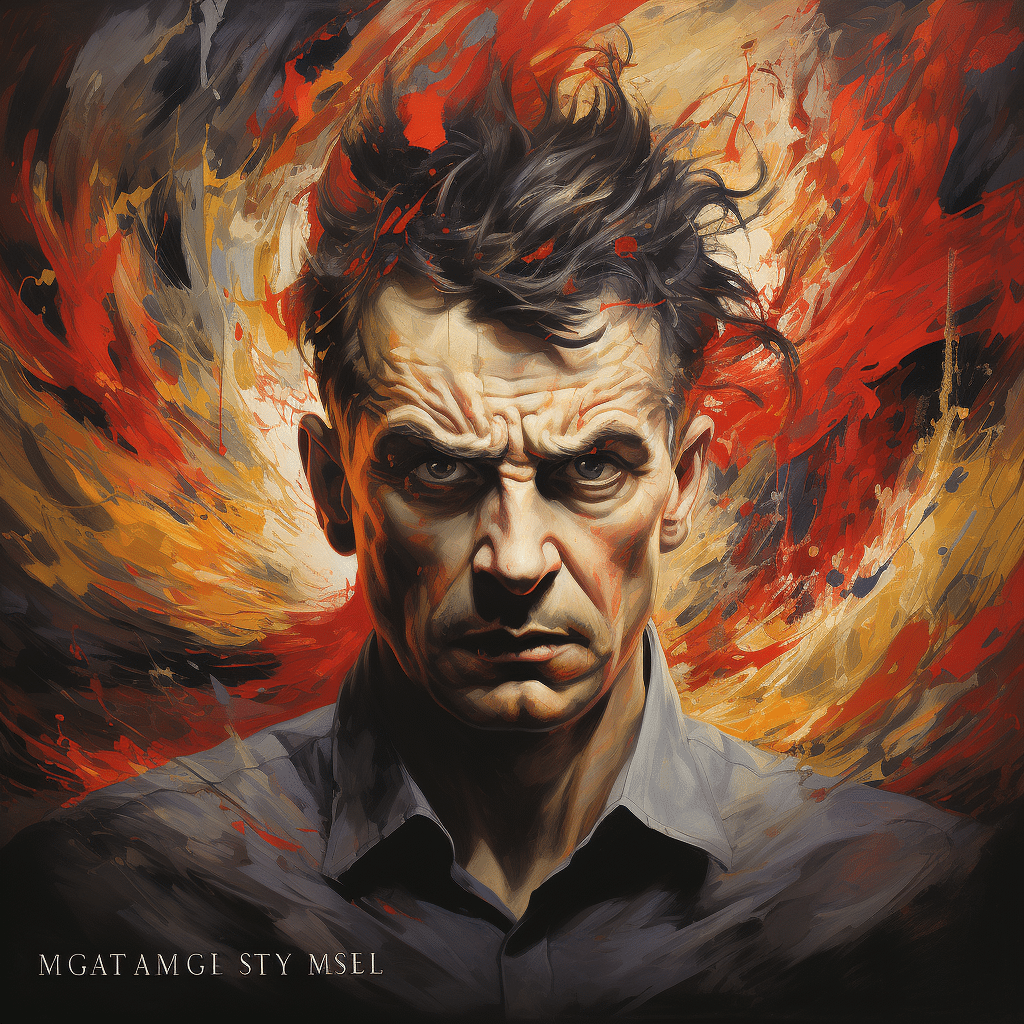Navigating the tumultuous seas of emotion, particularly anger, can be a daunting voyage. But in 2024, the anger management books lining our shelves provide an indispensable compass. For those weathering the storm of a child’s addiction or mourning the unimaginable loss of a loved one, these books offer solace, understanding, and a path forward. As we embark on this literary exploration, we invite you to discover the profound effect that knowledge can have on mastering the ebb and flow of emotional tides.
The Role of Literature in Mastering Your Emotions
Anger, the fiery companion that accompanies us far more often than we’d like to admit, can be a force for good or a harbinger of destruction. It can be the spark that fuels positive change or the blaze that consumes us. Understanding and managing this emotion are critical, not only for our well-being but for the fabric of our relationships.
Books are more than just collections of words; they’re vessels carrying the collective wisdom of generations. They have the power to transform, teach, and transcend the ordinary—and when it comes to managing anger, their role becomes indispensable. Let’s delve into the psychological intricacies of anger, unearthing why texts on tempering its flames are so much more than ink on paper.

Top Anger Management Books of the Year: A Guide for Emotional Equilibrium
The year 2024 has seen a plethora of publications dedicated to the art of anger management, each offering unique insights into emotional regulation. We’re sifting through these literary gems to handpick those that shine the brightest.
These books are not only flying off the shelves but also transforming lives. As one reader put it, “I found my anchor in a sea of rage; these books were my lifeline.”
| **Book Title** | **Author(s)** | **Year Published** | **Key Focus** | **Age Group** | **Price Range (USD)** | **Features** | **Reader Benefit** |
|---|---|---|---|---|---|---|---|
| Anger Management for Dummies | Charles H. Elliott, Laura L. Smith | 2019 | Understanding and applying anger management strategies | Adults | $15-$25 | Accessible language, practical techniques, step-by-step guides | Improved self-control and relationship management |
| Rage: A Step-by-Step Guide to Overcoming Explosive Anger | Ronald Potter-Efron | 2007 | Techniques to cool down and manage powerful anger | Adults | $15-$20 | In-depth exploration of anger, actionable steps, strategies | Better understanding and control of explosive anger |
| Cooling Down Your Classroom | Trevor Romain | 2005 | Anger management for educators teaching children | Educators | $25-$35 | Activity guides, lesson plans, practical advice | Enhanced classroom management skills |
| The Angry Dragon | Michael Gordon | 2018 | Story-based approach to explain anger to children | Children | $10-$15 | Engaging illustrations, simple narrative structure | Teaches children to understand and manage their emotions |
| The Anger Trap | Les Carter | 2003 | Identifying and changing patterns that fuel anger | Adults | $10-$20 | Personal stories, psychological perspectives | Insight into personal anger triggers and cycles |
| When Anger Hurts | Matthew McKay, Peter D. Rogers, Judith McKay | 2003 | Reducing anger-induced relationship problems | Adults | $15-$25 | Skills training, quizzes, exercises | Healthier communication and reduced relationship strife |
| Anger Management Workbook for Kids | Samantha Snowden | 2018 | Exercises for learning anger management skills for kids | Children | $10-$15 | Age-appropriate activities, colorful worksheets, easy-to-follow explanations | Helps kids develop early anger coping mechanisms |
| Don’t Let Your Emotions Run Your Life for Kids | Jennifer J. Solin, Christina L. Kress | 2017 | DBT skills to help children manage mood swings, anger, and anxiety | Children | $12-$18 | Evidence-based approach, engaging exercises, interactive activities | Helps children build emotional resilience and regulation |
| Calming the Emotional Storm | Sheri Van Dijk | 2012 | Using dialectical behavior therapy (DBT) to manage emotions | Adults | $15-$20 | Clear explanation of DBT concepts, real-life examples | Readers learn practical skills to navigate emotional crises |
| The Cow in the Parking Lot | Susan Edmiston, Leonard Scheff | 2010 | Zen approach to transforming anger | Adults | $10-$15 | Humorous perspective, practical tips, Zen stories | Reduces anger through mindfulness and perspective shifts |
Mindfulness and Anger: A Tranquil Approach to Taming Tempests
In the calming waves of mindfulness, we often find an effective antidote to anger. Mindfulness challenges us to sit with our emotions, to understand their origins, and gently guide them towards more peaceful waters.
Through mindful reflection, we can transform our inner turmoil into tranquility, all the while acknowledging that mindfulness is not a quick fix but a lifelong journey.

“The Anger Book”: Antidote to Outrage or Just Another Tome on the Shelf?
“The Anger Book: Simple, Fast, and Effective Relief from Anger and Irritability” by John Lee has received quite the buzz. But is it a true balm for fury, or merely another drop in an ocean of self-help? I dove in, expecting perhaps a reiteration of well-tread concepts, but emerged pleasantly surprised.
Scholars respect its meticulous research, and readers praise its practicality, marking “The Anger Book” as a heavyweight in its category.
Cognitive Behavioral Strategies: Rewiring the Brain for Peace
Strategies from cognitive-behavioral therapy (CBT) can be particularly powerful in rehabilitating the mind’s response to anger-inducing stimuli. Books in this domain present evidence-based techniques with the precision of a surgeon’s scalpel.
Each book serves as an architect, helping readers rebuild their cognitive foundations to harbor more peace.
The Spectrum of Anger: Books Addressing Specific Audiences
Anger manifests differently across the spectrum of life stages and personalities. Several books have risen to prominence by targeting these variegated experiences.
Each book acts like a polished mirror, reflecting back an understanding of anger tailored to the reader’s unique needs.
Empirical Evidence: The Science Behind the Best Anger Management Books
Credible anger management books are backed by science; they’re not just philosophical musings. When an author’s claim is buoyed by empirical evidence, their words carry the weight of truth.
For example, “The Explosive Child” by Ross W. Greene translates years of psychological research into strategies for dealing with chronically inflexible children. Studies in the realms of behavioral psychology ground the techniques in reality. It’s this dance of data and practicality that makes these recommendations powerful.
Harnessing Anger for Positive Change: Books That Challenge the Narrative
In the pages of certain groundbreaking books, anger is reframed as a tool for positive change rather than a beast to be subdued. These works challenge the narrative surrounding this often-maligned emotion.
These books suggest a paradigm shift, where anger is not an adversary but an ally in the quest for a better world.
A Digital Age of Anger Management: Audio Books and E-Books
The advent of digitalisation has caused a significant evolution in how we consume literature, and anger management books are no exception.
These digital formats extend the reach of therapeutic literature, ensuring that whenever the storm clouds of anger roll in, relief is just a click away.
Conclusion: Calm Beyond the Page
In wrapping up, it’s evident that 2024’s slate of anger management books is a treasure trove of insights, perspectives, and strategies. From traditional psychological approaches to the avant-garde reimagining of anger’s purpose, these texts light the path to emotional mastery.
But the journey doesn’t end with the turn of the last page. To truly claim dominion over our anger, we must not only engage with these resources but integrate their lessons into the sinews of our daily lives.
As we stand on the precipice of embracing these teachings, let’s remember that the conquest of anger is an act of bravery, one that requires every ounce of our courage and commitment. May these books be your allies as you stride forward on this journey—a journey not just of self-improvement, but of profound reconnection with the essence of who you are and who you can be.
Discover Fascinating Trivia in Anger Management Books
Have you ever wondered about the towering presence of emotions in literature, much like how Heath Ledger’s height left an indelible mark on his performances? Well, much in the same way, anger management books have a striking impact on their readers, guiding them toward emotional control and stability. Speaking of towering, did you know that Heath Ledger’s characters often struggled with intense emotions? Learning about Heath Ledger ‘s height might just give you a new perspective on how we perceive emotions and the characters that embody them.
Now, on a seemingly unrelated note, the P-39 was a WWII fighter plane known for its quirky design and tenacious nature. Funnily enough, the process of managing anger can be akin to piloting a P-39; it requires focus, an understanding of the mechanics, and the tenacity to persevere. These p-39( qualities are strongly reflected in the principles taught in many anger management books. As you leaf through the pages, imagine the discipline and skill of those WWII pilots navigating the skies, as you navigate your emotions.
Engage with Emotional Insights
On the flip side, nothing stirs the pot of emotions quite like personal loss. When strife hits close to home, our reactions can be unexpected. Grieving the loss of a sibling, for instance, can give way to a spectrum of emotions, where anger might rear its head. Finding solace in Losing a sister Quotes not only offers comfort but can also be a springboard for understanding the depths of our own anger. Anger management books often explore such heartfelt situations, providing a guiding hand through the turbulence.
Moreover, let’s not overlook the rough edges life can rub us with, especially when dealing with family turmoil such as seeing Moms drunk. It’s a jarring experience that isn’t always talked about but can certainly upheave the calmest of waters. The tools and exercises in anger management books can sometimes be the life jacket we didn’t know we needed, helping us stay afloat amidst the waves of emotion. Remember, folks, it’s about control, understanding, and sometimes, just keeping your head above water.

What is the best book to control anger?
– Oh, boy, if there’s a book out there that can turn down the heat on that hotheaded temper, it’s “Angry All the Time: An Emergency Guide to Anger Control” by Ronald T. Potter-Efron. It’s like a user manual for your fuse box, showing you how to cool your jets before you go from zero to Hulk.
What are the 4 Ts of anger?
– Got those fists clenched? Well, before you start seeing red, let’s talk about the 4 T’s of anger: triggers, thoughts, tantrums, and trouble. It’s like a racecar track in your head where each corner pits you against one of the T’s, driving you from irritation to a full-blown outburst.
What are the 5 levels of anger management?
– Levels of anger management? You bet there are! Picture it as a five-course meal, starting with mild annoyance and ending with dessert being a piece of humble pie. There’s mild annoyance, frustration, anger, hostility, and rage. Chew on that for a while and you’ll see how it helps us keep a lid on things!
What is the best anger management?
– The best anger management isn’t a one-size-fits-all cap, but tailoring coping strategies to fit snugly onto your personal hothead can work wonders. It’s a mix of recognizing when you’re getting steamed, cooling down with deep breaths, and finding better ways to express yourself without blowing a gasket.
What are the 3 anger rules?
– Ever heard the saying “rules were made to be broken”? Well, with anger, that’s not such a hot idea. Stick to these three golden rules: No hurting others, no hurting yourself, and no breaking stuff. They’re like training wheels for your temper; follow them and you’ll be riding smooth.
What is the highest form of anger?
– The highest form of anger is rage. It’s like the Mount Everest of mad, where you’re so steamed, you’re practically breathing fire and brimstone. It’s a full-blown emotional tornado, leaving a trail of destruction unless you tame that beast quick-smart.
What is root cause of anger?
– Root cause of anger, huh? Dig deep and you’ll likely find frustration, hurt, or feeling threatened buried in there. It’s the stuff that flicks on your internal alarm bells and makes your blood boil, often coming from feeling disrespected or powerless.
What are 3 anger triggers?
– Ah, the things that get our goats—anger triggers, right? There’s the classic trifecta: being disrespected, feeling threatened, or a whip-lashing of frustration. They’re like the match that lights the fuse to a firework of fury if we don’t douse them first.
What is blind rage?
– Blind rage is when you’re so flipping mad, you can’t see straight. Logic and reason have left the chat, and you’re running on pure, uncut anger. It’s like a storm cloud’s covering your eyes and all you see is lightning bolts of fury.
What is silent anger?
– Silent anger is when you’re boiling on the inside but cool as a cucumber on the outside. It’s like a stealth bomber of the emotional world; you might not be making noise, but, oof, the vibe is icy enough to frost windows.
What does true rage feel like?
– True rage? It’s like a beast’s let loose in your chest, clawing its way out. Your heart’s racing, your skin’s prickly, and your mind’s a one-track thought train to Angryville. It’s not just feeling cross—it’s top-tier, untamed tempest.
What is the 6 second rule of anger?
– The 6-second rule of anger is your handy pocket-sized fire extinguisher. It’s this: take six seconds to breathe deep and think before you act when you’re ticked off. Sounds simple, but those ticks of the clock can mean the difference between simmering down and boiling over.
Is anger issues a mental illness?
– Look, anger’s a spicy emotion, but it’s not a standalone mental illness. Still, if your kettle’s whistling more than it’s quiet, it might be a sign of an underlying condition like anxiety or depression, or even something called intermittent explosive disorder—and that’s a pot worth watching.
How can I fix my anger issues?
– Fixing anger issues is a DIY project worth undertaking. Start by acknowledging the problem, then learn what ticks you off. Get comfy with expressing yourself calmly, practice relaxation techniques, and hey, maybe even chat with a pro if the toolbox feels a bit light.
What not to do in anger?
– When anger’s got you in its grip, there are definite don’ts. Don’t go shooting your mouth off, don’t hold a grudge, and throw the idea of revenge out the window. These are like pouring gasoline on your inner bonfire—not a cool move.
How can I improve my self control when angry?
– Oh, self-control, that elusive beast when you’re hopping mad! Start by spotting your anger early—catch it while it’s a spark, not a blaze. Then call a time-out on yourself, get physical (in a healthy way, like a jog), and channel your inner Yoda for some deep-breathing zen.
How can I control my brain anger?
– Getting a grip on brain anger? First, flag it when that mercury rises. Next, try a bit of mental gymnastics—counting backwards from 100 can be surprisingly distracting. And don’t forget to give your mind a menu of calm-down thoughts, like picturing your happy place or reminding yourself that “this too shall pass.”




























